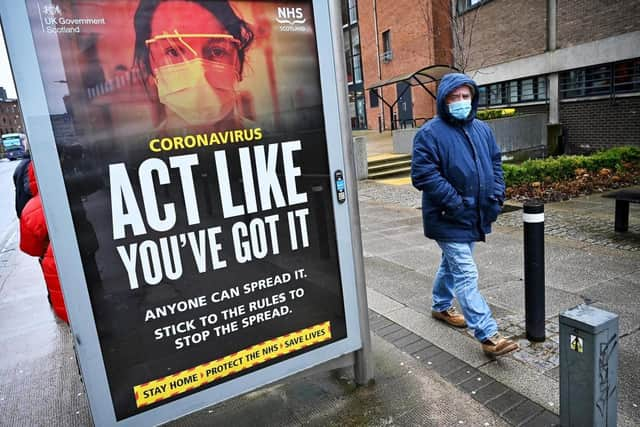UK Covid alert level raised following rapid increase in Omicron cases
The country’s four chief medical officers and NHS England’s national medical director have recommended to ministers that the UK go up to Level 4 from Level 3.
It comes as Boris Johnson prepares to address the nation at 8pm about the booster vaccine programme.
Advertisement
Hide AdAdvertisement
Hide AdThe decision to increase the alert level follows advice from the UK Health Security Agency (UKHSA) after a further 1,239 confirmed cases of the Omicron mutation were recorded in the UK as of Sunday.


It brings the total number of UK cases of Omicron to 3,137, a 65% increase from Saturday’s total of 1,898 UK cases.
Increasing the UK Covid alert level to Level 4 means the epidemic is “in general circulation, transmission is high and direct Covid-19 pressure on healthcare services is widespread and substantial or rising”, according to Government guidance.
In a joint statement, the CMOs and NHS England’s Professor Stephen Powis said the emergence of Omicron “adds additional and rapidly increasing risk to the public and healthcare services”.
They added: “Early evidence shows that Omicron is spreading much faster than Delta and that vaccine protection against symptomatic disease from Omicron is reduced.
“Data on severity will become clearer over the coming weeks but hospitalisations from Omicron are already occurring and these are likely to increase rapidly.”
The five officials, including England’s CMO Professor Chris Whitty, Northern Ireland’s Sir Michael McBride, Scotland’s Professor Gregor Smith, and Wales’ Dr Frank Atherton, said the NHS was already under pressure “mainly driven by non-Covid pressures”, with Omicron’s ability to escape vaccines “likely” to add to those demands.
“It is extremely important that if you are eligible, you get your Covid vaccination now – whether this be your first, second or booster dose,” they said.
Advertisement
Hide AdAdvertisement
Hide Ad“People should continue to take sensible precautions including ventilating rooms, using face coverings, testing regularly and isolating when symptomatic.”Earlier, Deputy First Minister John Swinney said all options were on the table for tackling the rise of the Omicron.
Speaking on the BBC’s The Sunday Show, Mr Swinney said: “Fundamentally we face a very serious threat because Omicron is frankly galloping its way in Scotland and circulating round our communities.
“The challenge for us is that obviously nobody would thank us if we planned on the best case scenario and it turned out to be the worst case scenario that prevails.”
However Mr Swinney refused to be drawn on measures such as closing down hotels, cafes, bars and restaurants.
Show host Martin Geissler asked: “If you had the funds to do it, would you be inclined to shut down the hospitality sector tomorrow?”
Mr Swinney said: “I don’t think there is a justification, we have to make sure that all of our measures are proportionate.”
Scottish Labour’s health and Covid recovery spokesperson Jackie Baillie said: “Businesses up and down the country aren’t just dreading the effects of the new variant, they are already feeling them.
“The latest advice is leading to parties being cancelled and bookings plummeting, but the hospitality industry is being left high and dry.
Advertisement
Hide AdAdvertisement
Hide Ad“Thousands of jobs are on the line but the SNP don’t seem to be listening.
“We should never shy away from difficult decisions to save lives, but we can’t destroy livelihoods in the process.
“Whether there are new restrictions or not, the SNP’s strategy cannot rely on hospitality taking the hit.
“They need to support businesses and protect jobs through this crisis.”
Mr Swinney said: “Restrictions are the last thing we want to do because that begins to inhibit the ability of people and businesses to operate normally as we would want them to operate.
“I am very troubled by the idea that everybody thinks or it is perceived that Omicron is a mild variant of the virus, that to me is actually quite irrelevant.
“If the cases rise exponentially, as we fear and as our modelling has suggested might be the case.
“The problem we have got here, and the First Minister made this point on Friday in her media briefing, is that even if there is a small level of hospitalisation of a very, very big number of infections in our society, that will overwhelm our NHS.
“And that is the blunt reality.
Advertisement
Hide AdAdvertisement
Hide Ad“In the space of a week Omicron has changed from being 2% of cases in Scotland to yesterday 18%.
“The doubling rate is just more than two days and that compares to earlier variants of the virus which were closer to 14 days.
“On Friday there were more than 60,000 vaccinations, in Scotland we are the most vaccinated part of the UK, we should be looking at how we can accelerate the pace.”
The latest statistics show 38 more Omicron cases have been confirmed in Scotland, taking the total to 159.
There were 4,002 coronavirus cases in total reported in the last 24 hours, with no new deaths.
